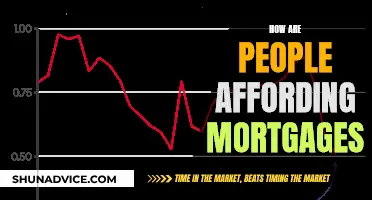
Walking away from a mortgage, also known as a strategic default, is when a homeowner decides to stop making payments and surrender the property to the lender. While this is not an illegal act, it can have serious consequences, including a negative impact on your credit score, difficulty obtaining credit or loans in the future, and potential tax consequences. In some cases, walking away from a mortgage can be the most prudent choice, especially if you owe more on your mortgage than your home is currently worth or if you have an adjustable-rate mortgage. However, it is important to consider the long-term costs and potential alternatives, such as negotiating with the lender or seeking legal advice, before making the decision to walk away.
Characteristics of Walking Away from a Mortgage
| Characteristics | Values |
|---|---|
| Credit Score | Your credit score will be damaged, making it hard to get credit in the future. |
| Legal Consequences | Lenders have a legal right to repossess the property. They can also report the borrower to credit reporting agencies. |
| Civil Lawsuit | The lender can sue the borrower in civil court to obtain the remaining debt. |
| Tax Implications | The IRS may require you to pay taxes on forgiven debt, treating it as income. |
| Financial Flexibility | Walking away can free you from debt and provide flexibility to improve your overall financial situation. |
| Stigma | There is a stigma associated with walking away from a mortgage, as some consider it morally wrong. |
| Emotional Impact | Walking away from a mortgage can be emotionally challenging and lead to feelings of shame and anguish. |
| Other Assets at Risk | In recourse states, lenders can pursue your other assets, such as savings accounts, automobiles, or wages. |
| Renting vs. Buying | Walking away from a mortgage may lead to renting, which offers simplicity and fewer responsibilities than homeownership. |
| Short Sale | Instead of walking away, a short sale involves surrendering the home to the bank, potentially avoiding the long-lasting impact of foreclosure on your credit history. |
What You'll Learn

It can be the best option if you can rent a similar home for less
Walking away from a mortgage, or strategic default, can be the best option for homeowners who find themselves in a negative equity position. If you can rent a similar home for less, it may make more financial sense to default on your mortgage and rent instead. This is especially true if the home has lost value and is now worth less than what is owed on the mortgage.
In such a scenario, the cost of continuing to pay the mortgage may outweigh the benefits of homeownership. By renting a similar home for a lower monthly payment, individuals can free up cash flow and potentially save more or invest the difference. This option can be particularly attractive to those who prioritize financial flexibility and liquidity.
Strategic default can also be a strategic move for those seeking to relocate or downsize. If an individual's circumstances change, such as a job loss or relocation to a different city, defaulting on the mortgage and renting a similar home in a new location can provide more financial flexibility and stability. It allows individuals to adapt to changing circumstances without being tied down by a burdensome mortgage.
Additionally, for those who may have purchased a home that no longer meets their needs or expectations, strategic default can offer a way out. If a homeowner finds themselves in a situation where the home has structural issues, is in a declining neighborhood, or no longer suits their lifestyle, walking away from the mortgage and renting a more suitable home could be a viable option.
However, it is important to consider the potential consequences of strategic default, including damage to credit scores and the possibility of legal repercussions. Homeowners considering this option should carefully weigh the pros and cons and seek financial and legal advice to make an informed decision.
Closing Costs: Who Pays What in a Mortgage?
You may want to see also

It can free you from a mountain of debt
Walking away from a mortgage can free you from a mountain of debt, especially if you live in a non-recourse state. In such states, lenders cannot go after your other assets to collect the money owed to them. This means that walking away from your mortgage can free up your budget to pay off other debts, save for retirement, and improve your overall financial situation.
However, it is important to note that walking away from a mortgage can have serious consequences, including damage to your credit score, which can make it difficult to obtain credit in the future. You may also face harassment from collection agencies attempting to collect mortgage payments. Furthermore, if you default on your mortgage, it may take years to obtain another one, and you may have to pay taxes on the forgiven debt, as the IRS treats canceled debt as added income.
Before making any decisions, it is crucial to understand your state's laws and consult with a local attorney or experienced mortgage lawyer. They can advise you on the best legal options, such as negotiating a debt settlement plan with your lender or filing for bankruptcy. Additionally, an attorney can represent your interests in court if your lender initiates a civil lawsuit against you.
It is also worth considering other options before walking away from your mortgage. For example, you could negotiate with your lender to modify the terms or repayment structure of your loan or utilize forbearance to stall the foreclosure process and gain more time to pay your loan. Selling your home and cutting your losses may also be a better alternative than simply walking away from your mortgage.
New vs Existing Construction Mortgages: What's the Difference?
You may want to see also

It will harm your credit score
Walking away from a mortgage will harm your credit score. When you walk away, you could see a FICO score drop by 200 points or more. Since credit scores are used for many things these days, this could hurt your chances of getting a new job, renting a new place, or getting a new mortgage. Credit card companies often cancel cards or lower credit limits as a result of missed mortgage payments. If you default on your mortgage, it will take years to get another one. Foreclosed borrowers can expect to wait between two and five years before they can get a new mortgage. Borrowers who voluntarily walk away may have to wait even longer.
In recourse states, lenders can go after your assets for money owed to them. When you walk away from your mortgage obligation, lenders will try to collect the difference between what you owe and what they recover by selling your former home. If they aren't made whole, there's a possibility they'll come after your other assets, including savings accounts, automobiles, second homes, and wages. The lender can sue the borrower in civil court and attempt to obtain a writ of execution to reach the borrower's other assets to satisfy the remaining debt.
Walking away from a mortgage can also result in harassment from collection agencies attempting to collect mortgage payments. Additionally, if you walk away, the IRS may make you pay taxes on your forgiven debt, which they treat as income.
In non-recourse states, where lenders cannot pursue borrowers for money owed beyond the value of the collateral, walking away from a mortgage can free you from a mountain of debt. This creates flexibility to recast your budget so that you can pay off other debts, save for retirement, and improve your overall financial situation.
Understanding Mortgage Finance Charges: Computation Methods Explained
You may want to see also

It may result in a huge tax bill
Walking away from a mortgage can have serious consequences, and one of the most significant is the potential for a large tax bill. This is due to the tax treatment of the difference between what is owed to the bank and what the bank will receive from the sale of the property. If this difference is treated as a debt that has been forgiven, it can be considered income, and taxes may be owed on this amount. In some cases, this could result in a substantial tax bill, especially if the property has been sold for significantly less than what is owed on the mortgage.
For example, let's consider a situation where a homeowner owes $204,000 to the bank but the bank is only able to sell the property for $90,000. In this case, the difference of $114,000 could be treated as income for the homeowner. If the homeowner is in a 33% tax bracket, they would owe $37,000 to the IRS, which is a significant amount.
It's important to note that the tax consequences of walking away from a mortgage can vary depending on the specific circumstances and the applicable tax laws. In some cases, there may be tax relief or exemptions available, such as the Mortgage Forgiveness Debt Relief Act of 2007 in the United States. However, it's always advisable to consult with a qualified tax professional or attorney to understand the potential tax implications before making any decisions.
Additionally, walking away from a mortgage can have other financial consequences, such as a negative impact on one's credit score, making it more difficult to obtain credit in the future. It can also result in harassment from collection agencies seeking to collect the remaining mortgage payments. Therefore, it is crucial to carefully consider all the potential consequences and seek professional advice before making any decisions about walking away from a mortgage.
Overall, while walking away from a mortgage may seem like a tempting option, particularly in times of financial hardship, it is important to be aware of the potential tax implications and other negative consequences that may arise. Exploring alternative options, such as negotiating with lenders to modify loan terms or repayment structures, can help mitigate these risks and provide a more favourable outcome.
Making Mortgage Overpayments: How Does It Work?
You may want to see also

It can be the best option if you have an adjustable-rate mortgage
Walking away from a mortgage can have serious consequences, including a negative impact on your credit score, harassment from collection agencies, and legal repercussions. However, in certain situations, it may be the best option, especially for those with adjustable-rate mortgages (ARMs).
Adjustable-rate mortgages are a type of mortgage where the interest rate is not fixed and can fluctuate over time. During periods of rising interest rates, homeowners with ARMs may find themselves facing higher monthly payments, which can become unaffordable. In such cases, walking away from the mortgage may be a prudent choice.
- Financial Relief: If you have an ARM and interest rates are rising, your monthly payments can increase significantly. Walking away from the mortgage can provide financial relief by lowering your monthly expenses. This can be especially beneficial if you can find a similar rental property for less than your current mortgage payment.
- Market Conditions: During a housing crisis or a plunge in property values, as seen in 2008 and 2009, homeowners with ARMs may find themselves underwater on their mortgages. In such cases, walking away can be a strategic decision to minimize losses.
- Lifestyle Considerations: Owning a home comes with various responsibilities and maintenance costs. By walking away from an ARM and renting instead, you can reduce the burden of homeownership and gain the simplicity and flexibility that renting offers.
- Alternative Options: If you're struggling to keep up with the terms of your ARM, walking away may be a last resort. However, before making that decision, explore alternative options such as negotiating with your lender to modify loan terms, utilizing forbearance, or considering a short sale or voluntary foreclosure.
It's important to note that walking away from any mortgage, including an adjustable-rate mortgage, should be a well-informed decision. Consult an experienced mortgage lawyer or financial advisor to understand the legal and financial implications and explore all available options before taking any action.
Mortgage Application Assessments: What Lenders Look For
You may want to see also
Frequently asked questions
Walking away from a mortgage is not illegal, but it can have serious consequences. The most common consequence is that the lender has a legal right to repossess the property. Walking away will also damage your credit score, making it difficult to get credit in the future. You may also be pursued by collection agencies, and you could be sued by the lender in civil court.
Walking away from a mortgage should be a last resort. However, in some cases, it may be the best option. For example, if you owe more on your mortgage than your home is currently worth, and you can rent a similar property for less, it may make financial sense to walk away. It may also be acceptable to walk away if you discover that the mortgage was initiated through a scam or mortgage fraud.
If you are struggling to make payments, there are several alternatives to walking away. You could negotiate with your lender to modify the terms of the loan or the repayment structure. You could also utilise forbearance to stall the foreclosure process and give yourself more time to pay. Other options include putting your home up for a short sale, voluntarily turning it over to the bank, or selling the property and recouping the money.







